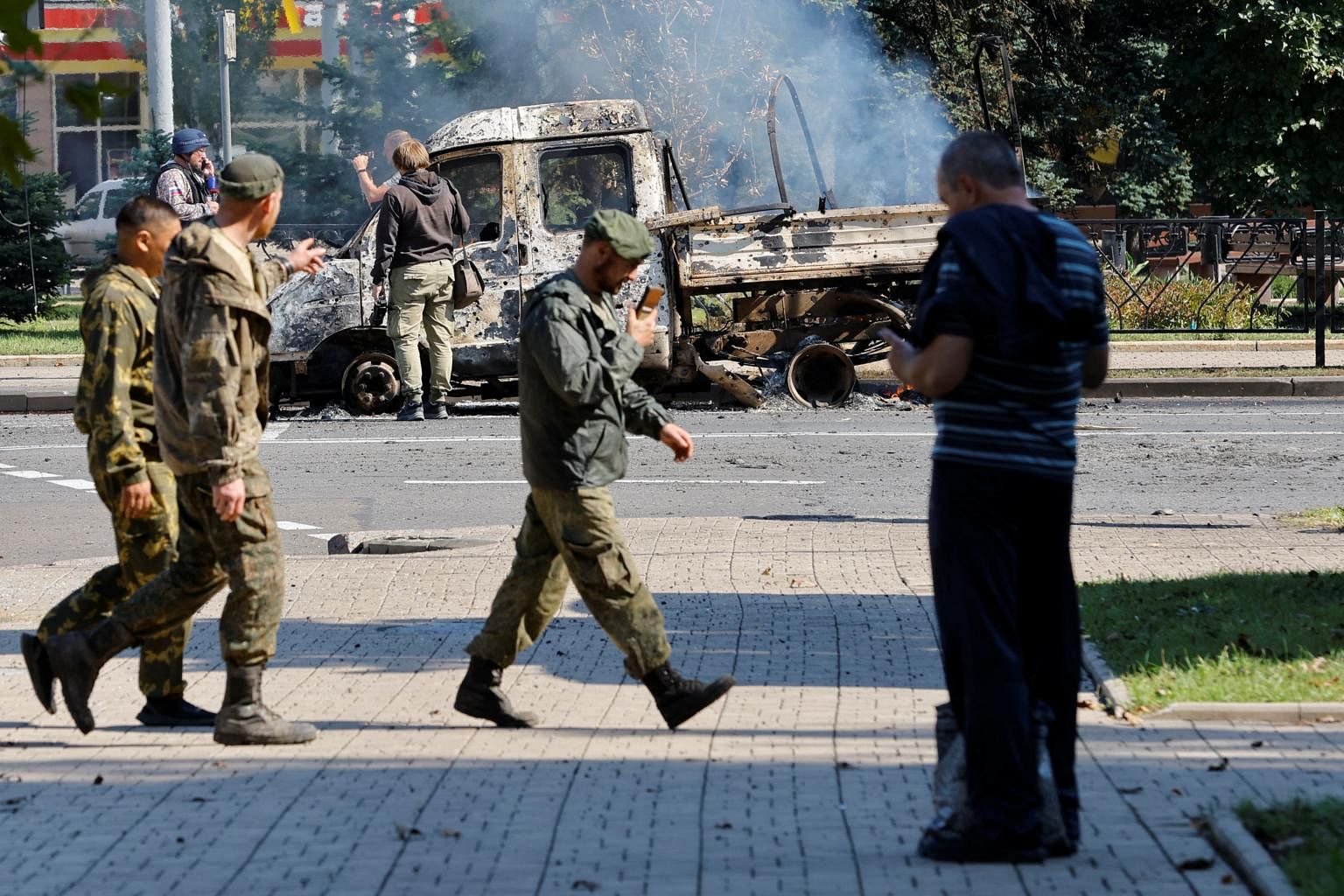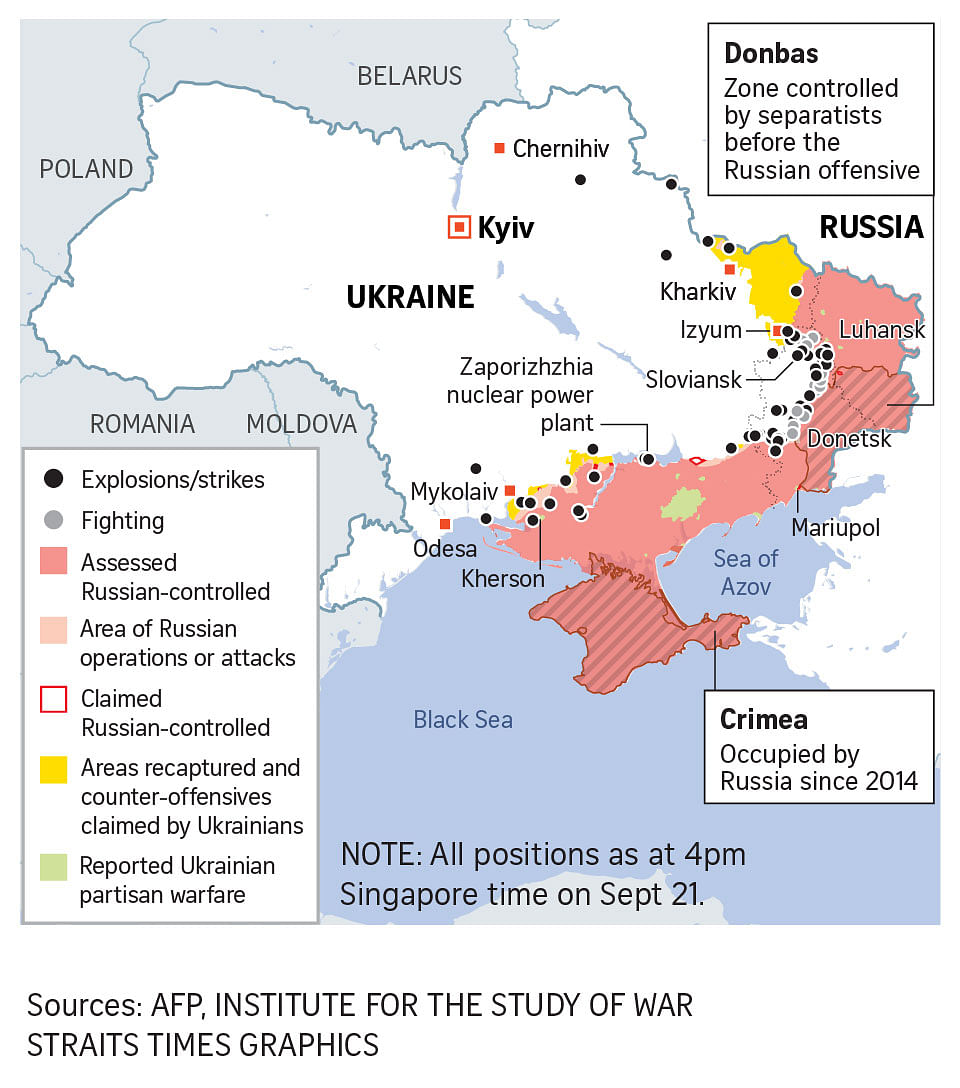MOSCOW - Russian President Vladimir Putin on Wednesday ordered Russia’s first mobilisation since World War II, warning the West that if it continued what he called its “nuclear blackmail”, Moscow would respond with the might of all its vast arsenal.
“If the territorial integrity of our country is threatened, we will use all available means to protect our people – this is not a bluff,” Mr Putin said in a televised address to the nation, adding that Russia had “lots of weapons to reply”.
Russia’s defence minister said the partial mobilisation will see 300,000 reserves called up and would apply to those with previous military experience.
In an interview with Russian state television, Mr Sergei Shoigu said that students and those who served as conscripts would not be called up, and that the majority of Russia’s millions-strong reserves would not be drafted.
He also said that nearly 6,000 Russian soldiers have died in Ukraine since the February military intervention, in a rare admission of military losses from Moscow.
“Our losses for today are 5,937 dead,” Mr Shoigu said, adding that Russia is “fighting not so much Ukraine as the collective West” in Ukraine.
Mr Putin’s partial mobilisation significantly escalates the conflict over Ukraine and comes as Russia battles a Ukrainian counter-offensive that has forced its troops to retreat and surrender some occupied territory.
Mr Putin said the partial military mobilisation of its two-million-strong military reserves was to defend Russia and its territories, claiming the West did not want peace in Ukraine.
“To protect (the) homeland, its sovereignty... I consider it necessary to support the decision of the General Staff on partial mobilisation,” he said.
British defence minister Ben Wallace said the mobilisation was an admission by Mr Putin that “his invasion is failing”.
"(Putin) and his Defence Minister have sent tens of thousands of their own citizens to their deaths, ill equipped and badly led,” Mr Wallace said in a statement.
“No amount of threats and propaganda can hide the fact that Ukraine is winning this war, the international community are united and Russia is becoming a global pariah.”

China’s foreign ministry urged all parties to engage in dialogue and consultation, and find a way to address the security concerns of all parties.
China’s position on Ukraine is consistent and clear, Chinese foreign ministry spokesman Wang Wenbin said at a regular media briefing on Wednesday.
Ukraine on Wednesday remained unperturbed, saying that Russia’s mobilisation was a predictable step that will prove extremely unpopular.
It also underscores that the war is not going according to Moscow’s plan, Ukrainian presidential adviser Mykhailo Podolyak told Reuters.
Mr Podolyak said in a text message that Mr Putin was trying to shift the blame for starting an “unprovoked war”, and for Russia’s worsening economic situation, onto the West.
Latvia, which borders Russia, said it would not offer refuge to any Russians fleeing Moscow’s troop mobilisation. In a tweet, Latvian Foreign Minister Edgars Rinkevics cited security concerns for the decision.
Still, Russia’s rouble fell and global oil prices surged after Mr Putin’s comments. European shares fell at the opening on Wednesday as news of the mobilisation added to investor worries over the United States Federal Reserve’s likely third straight super-sized interest rate hike later in the day.
The continent-wide STOXX 600 index dropped 0.3 per cent, with most of its sub-sectors lower. The rate-sensitive technology sector index fell 1.2 per cent, while energy stocks gained 1 per cent.
The war has already caused a spike in fuel and food prices around the world.
Mr Putin restated his aim was to “liberate” east Ukraine’s Donbas industrial heartland region and that most people in the region did not want to return to what he called the “yoke” of Ukraine.
Russia already considers Luhansk and Donetsk, which together make up the Donbas region Moscow partially occupied in 2014, to be independent states.
Ukraine and the West consider all parts of Ukraine held by Russian forces to be illegally occupied.
Russia now holds about 60 per cent of Donetsk and had captured nearly all of Luhansk by July after slow advances during months of intense fighting.

Those gains are now under threat after Russian forces were driven from neighbouring Kharkiv province this month, losing control of their main supply lines for much of the Donetsk and Luhansk front lines.
In an apparently coordinated move, pro-Russian figures on Tuesday announced referenda for Sept 23-27 in Luhansk, Donetsk, Kherson and Zaporizhzhia provinces, representing around 15 per cent of Ukrainian territory, or an area about the size of Hungary.
"Sham referenda and mobilization are signs of weakness, of Russian failure,” Ms Bridget Brink, the US ambassador to Ukraine said on Twitter. REUTERS, AFP
